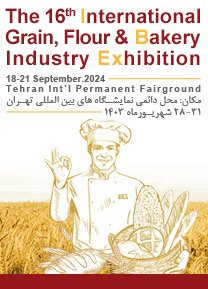




History of Bakery
Grains and products related to it, particularly bread, constitute the main part of the foods of most nations all over the world. No doubt, bread is one of the most ancient productions of human beings. The bread we eat today has a six-thousand year history. Using leavened dough for making bread was discovered by experience. Ancient Egyptians were among the first nations who used yeast in baking bread.
Wheat is planted more than any other plant in the world. Its species and numbers that are planted on earth are more than any other seed plant. All over the world, no month passes without planting or harvesting wheat.
In the present world, wheat is not only a vital food material, but is strategically and politically as important as oil: the weapon of wheat is more powerful than military weapons. The political and economic significance of grains, particularly wheat, results from the fact that the exporters of grains are an organized and united group. This unity has increased the power of these countries termed as the "Green Power." Food boycott is one of the powerful weapons of this group. Therefore, in countries such as Iran which have high range of bread consumption, we have to do our best to plant wheat by right methods, to promote the quality of seed, to improve the ways of seed storage and grind and finally to decrease the bread waste.
Bread and farinaceous products are the most important nutrition sources for Iranian people. Furthermore, these products are the main source of calories, protein and B vitamins as well as mineral ingredients.
Up to the last three decades, bread was made by traditional methods. After that when the producers of bulked bread gradually started their work alongside the traditional units, this modern method was continued without any research or codified plan. Whereas, production of good bread requires subtle information on flour, the methods of making dough, leavening and precision in the bakery system. Careful packaging and storing of bread paves the way for the decrease of bread waste and as a result moving toward self-sufficiency and economy in wheat consumption. Considering the application of new methods for producing and processing dough, appropriate machines and modern technologies, good bread with higher nutritional values and more economical methods can be produced. The history of bread production and consumption in the world shows that bread was first produced in thin and flat forms, but gradually it was baked in semi-bulked and, in advanced countries, in complete bulked forms.
Attaining the self-sufficiency in the production of wheat in 2004 is one of the honors of the Islamic Republic of Iran. However, what must be taken into consideration is the way of storing the seeds and building standard silos (Unfortunately, standard silos of Iran can store only one-third of the wheat production.). The appropriated transportation and grind of seeds according to the type of bread is very important. The flour quality varies with the weather conditions, type of seed and the manner of planting, harvesting and grinding.
Achieving the desirable quality of the product requires special knowledge and profession in the field. Although the alterations in the seed quality are in no relation with the owners of the flour industry, they have to be able to acquire the necessary knowledge and skill in order to improve the quality of flour.
If we look at the issue of bread in our country from different angles, we'll come to this conclusion that in the communication era, the existing waste in bread sector is not logical. The only problem is the lack of training in the sectors of production, distribution and consumption.
In the production sector, there are numerous problems in bread industry including the hardships of work, lack of acquaintance of bakers with the right methods of making bread and the frequent changes in the quality of flour.
Unfortunately, so far, we had no training program for the public regarding the right consumption of bread: buying the right type of bread, cooling bread before packing it, keeping bread in good packages and storing bread in homes.
According to health and nutrition experts, most diseases which are resulted from the type of nutrition, can be treated and prevented by using rich and wholesome materials. The expansion of urbanism, the development of technology, the inclination of people toward using prepared and half-baked foods and the different life-styles are among effective factors on public nutrition and health.
It is certain that following the hygienic and technical standards in producing bread, the most important food stuff in our country, cannot be avoided. The non-observance of hygienic standards and technical principles can threaten the social health and environment. Trained and expert workers can prevent the threats and add to the productivity of the work and protect public benefit. They can also play a significant role in guaranteeing the quality of products.
Therefore, the production of healthy bread is an ethical and a nutritional responsibility of the industry owners. Training workers and making them acquainted with health and technical principles are the main requirements of bread industry.
88070693 (21) 98+
88070844 (21) 98+
88070833 (21) 98+
No.908, Alvand Tower, Ebrahimi St, Marzdaran Blvd, Tehran, Iran



